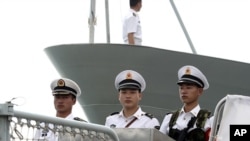Chinese state media say a planned naval exercise that is causing concern in Japan is not related to recent maritime tensions in the Pacific region.
Japan's defense ministry reported Wednesday that six Chinese naval vessels have crossed between two of its islands into the western Pacific Ocean. The NHK television network said one of the vessels was an intelligence-gathering ship.
China's defense ministry announced hours later that it is planning a naval training exercise in the western Pacific. It said the drill will adhere to relevant international laws and practice and is not directed against any particular country.
The exercise comes amid China's increasingly assertive maritime claims in the South and East China Seas, and just a week after U.S. President Barack Obama announced plans to station U.S. Marines in northern Australia
But China's Global Times newspaper, which is affiliated with the ruling Communist Party, quoted experts Thursday as saying the exercise has been scheduled for many months. One expert told the newspaper the drill is aimed at testing new naval equipment under challenging weather conditions.
Chinese naval commanders have long worried that their access to the Pacific is restricted by a string of mainly Japanese islands stretching from South Korea in the north to Taiwan in the south. Japan permits free navigation through the island chains but keeps a close watch on Chinese ship movements.
In its statement Wednesday, Beijing said China's lawful rights, including free navigation in relevant waters, should not be hindered.
China has been building up its naval power, including a recent sea trial of its first aircraft carrier. The build-up has been accompanied by a major diplomatic dispute with Japan over islands in the East China Sea and moves to disrupt oil and gas exploration by Vietnam and the Philippines in disputed areas of the South China Sea.
Obama's decision to station U.S. troops in Australia was widely interpreted as a move to balance China's rising power. During his high-profile visit to the region last week, Obama announced a policy "pivot" toward Asia and declared the United States is in Asia to stay.
Some information for this report was provided by AFP.




